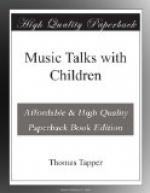Did you ever notice how people seem willing to stop any employment if music comes near? Even in the busiest streets of a city the organ-man will make us listen to his tunes. In spite of the hurry and the crowd and the jumble of noises, still the organ-tones go everywhere clear, full, melodious, bidding us heed them. Perhaps we mark the music with the hand, or walk differently, or begin to sing with it. In one way or another the music will make us do something—that shows its power. I have seen in many European towns a group of children about the organ-man,[2] dancing or singing as he played and enjoying every tune to the utmost. This taught me that music of every kind has its lover, and that with a little pains and a little patience the love for music belongs to all alike, and may be increased if other things do not push it aside.
Now, one of the first things to be said of music is that it makes happiness, and what makes happiness is good for us, because happiness not only lightens the heart, but it is one of the best ways to make the light come to the face. The moment we study music we learn a severe lesson, and that is this: There can be no use in our trying to be musicians unless we are willing to learn perfect order in all the music-tasks we do.
In this, music is a particularly severe mistress. Nothing slovenly, untidy, or out of order will do. The count must be absolutely right, not fast nor slow as our fancy dictates, but even and regular. The hands must do their task together in a friendly manner; the one never crowding nor hurrying the other, each willing to yield to the other when the right moment comes.[3] The feet must never use the pedals so as to make the harmonies mingle wrongly, but at just the right moment must make the strings sing together as the composer desires. The thoughts can never for a single moment wander from the playing; they must remain faithful, preparing what is to come and commanding the hands to do exactly the right task in the right way. That shows us, you see, the second quality and a strict one of music. It will not allow us to be disorderly, and more than this, it teaches us a habit for order that will be a gain to us in every other task. Now let us see:
First, we should study music for the happiness it will give us.
Second, we should study music for the order it teaches us.
There is a third reason. If music gives us happiness, do we not in learning it gain a power to contribute happiness to others? That is one of the greatest pleasures in learning. Not only does the knowledge prove of use and joy to us, but we can constantly make it useful and joy-giving to others. Does this not teach us how thankful we should be to all those who live usefully? And think of all the men who have passed their lives writing beautiful thoughts, singing out of their very hearts, day after day, all their life long, for the joy of others forever after.




